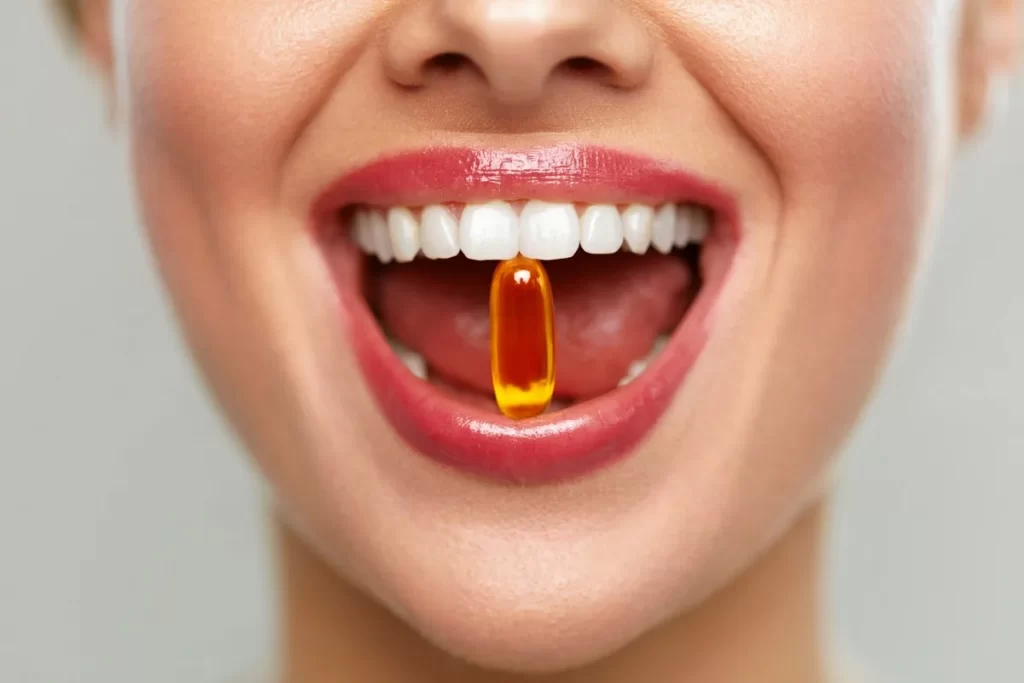America has a reputation for having extraordinarily high levels of obesity, but despite the extra chunk, majorities of people are suffering from vitamin deficiencies. It is estimated that 70 percent of the nation’s population has some type of vitamin deficiency and dental health will vary based on which nutrients are lacking. The best way to get the right nutrition is by eating a healthy diet and individuals concerned about their oral well being need to pay special attention to their calcium, B and C levels.
Calcium and Dental Health
Calcium is an important compound for “blood clotting, sending nerve signals, releasing hormones and enzymes, as well as muscle and blood vessel contraction and relaxation,” and is the most vital nutrient for the mineralization of human bones. Within a human body, bones and teeth are where 99 percent of our ingested calcium is stored and without the organic matter, humans would be at risk for a slew of gum disease and tooth loss.
Even in the healthiest of individuals, bone tissue breaks down. Once the bone is depleted, calcium is immediately dispersed to help strengthen the weakened areas and provide a foundation for new bone development. Individuals who are lacking calcium in their diet are weakening the bodies’ natural defense mechanism. That process can also trigger off periodontal disease, an oral infection caused when bacteria attacks gums. Over time, that infection will erode gum tissue, destroy the surrounding bone and weaken the connectivity between tooth and jawbone; increasing the odds of tooth loss. As a result of periodontal disease, gum tissue will break down and destroy the surrounding bone. As calcium supports your jawbone, it strengthens it against the bacteria that lead to a sad state of oral affairs.
Nature has created a multitude of ways for individuals to get their fair share of the vital nutrient and adults need a minimum of 1200 milligrams daily. The most common sources for calcium are dairy products including milk, cheese and yogurt and fish rich in Omega-3 fatty acids such as salmon, shellfish and sardines. Individuals who prefer dining on a plant based diet also have plenty of delicious ways to get their calcium as tofu, natural soy beans, almonds, dried beans and leafy greens such as kale, broccoli, spinach and cabbage are all vegan friendly sources of the nutrient.
Vitamin C and Dental Health
Even the healthiest person can experience a dental mishap that may require oral surgery such as gum grafts and bone grafts to repair. Healthy doses of Vitamin C can speed up the recovery process associated with those dental treatments. The ascorbic acid has been clinically proven to speed up the body’s natural recovery system of growing and regenerating healthy tissue. According to the Academy of General Dentistry (AGD) patients suffering from low levels of Vitamin C will need more time to recover from their oral surgery procedures.
Aside from hindering recovery efforts, a Vitamin C deficiency can cause scurvy, a disease triggered by the bodies inability to synthesis collagen. Once inflicted, the condition can cause dental problems including swollen gums, bleeding gums, loose teeth and increase the odds of tooth loss.
Plenty of nature’s bounties deliver healthy doses of vitamin C and citrus fruits, tomatoes, green peppers and potatoes are just a few of ways that individuals can work on eating their recommended daily dosage of 60 milligrams.
Individuals who prefer to get their Vitamin C source from supplements need to approach the task with caution. Chewable Vitamin C may be tasty, but the devices are high in levels of tooth enamel destroying acid. The acid can demineralize tooth enamel and will increase the odds of developing tooth erosion.
Vitamin-B for Dental Health
Vitamin-B is actually a complex comprised of eight vitamins, including thiamine (B1), riboflavin (B2), niacin (B3), pyridoxine (B6), folic acid (B9), cyanocobalamin (B12), pantothenic acid and biotin. That team effort is vital to have proper cell metabolism and without the compounds, a human body can be thrown off kilter. Individuals lacking this important network of nutrition can suffer from oral conditions including burning mouth syndrome, tongue inflammation, cracked lips and oral irritation.
Human intestines produce vitamin-B, making deficiencies rare in healthy individuals but can affect the elderly, alcoholics, individuals with digestive orders and impoverished individuals without access to healthy foods. Once again, nature has provided a myriad of ways for individuals to get their Vitamin-B complex needs from food sources. Whole-grains such as brown rice, quinoa and farro and red meat, egg yolks, green leafy vegetables, legumes, sweet corn, berries, yeast, nuts and cheese are all excellent nutritional sources.
Individuals looking to eat their way to better dental health should consume a diet rich in fruits, vegetables, whole grains and lean proteins while avoiding processed foods, sodium and saturated fats. Anyone confused on the subject can get the advice from their dentist.

